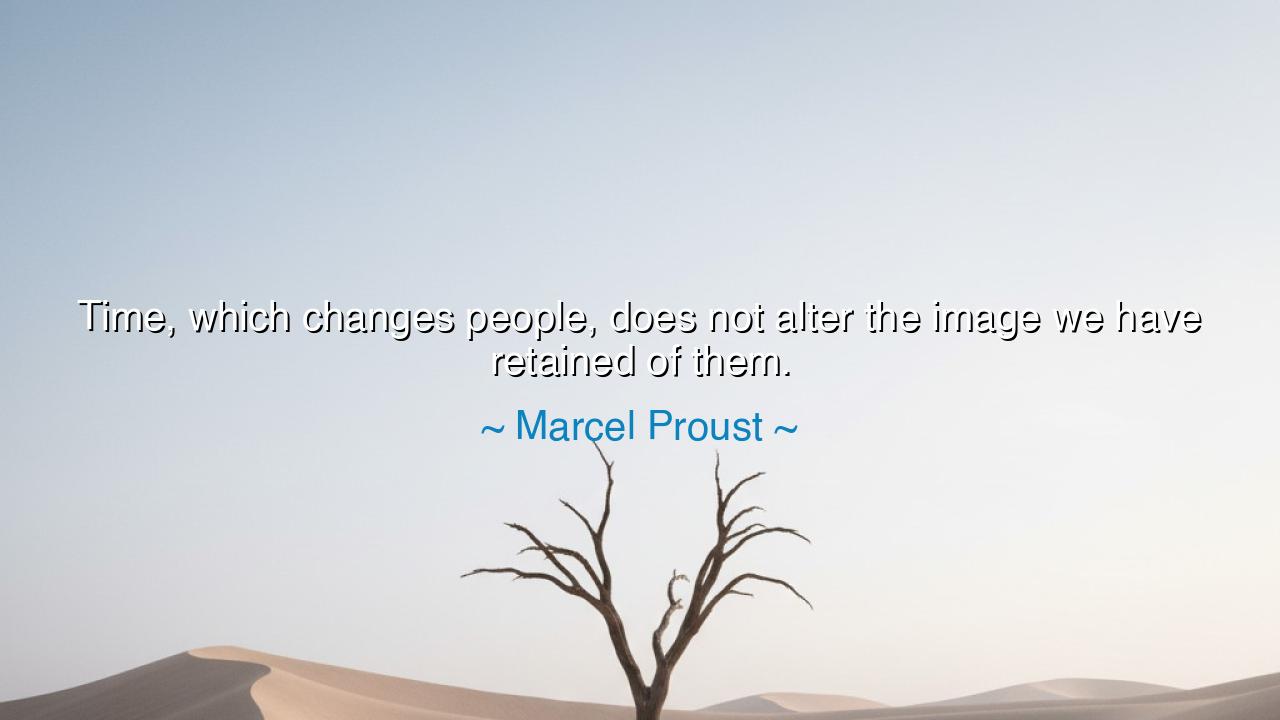
Time, which changes people, does not alter the image we have






The words of Marcel Proust, “Time, which changes people, does not alter the image we have retained of them,” fall like a soft but unshakable truth upon the heart. In this quote, Proust reminds us of the strange duality of memory: while time transforms faces, voices, and lives, the portraits painted in our minds remain untouched, preserved like flowers pressed between the pages of eternity. The man we once loved, the friend we once knew, the child we once held—all may change in the flow of years, but the memory of who they were to us remains fixed, unaltered by the river of time.
The origin of this insight lies in Proust’s great work, In Search of Lost Time, a vast meditation on memory, desire, and the fleeting nature of human existence. Proust, more than any other writer, sought to capture the way moments of the past cling to us, vivid and unchanging, even as the people who filled them move on and become different beings. He saw that memory is not a mirror but a painting, holding still what life has already allowed to slip away. His words are not only observation but lament, for they reveal the distance that grows between who people are now and who they remain in our minds.
The ancients, too, spoke of this strange hold of memory. Heraclitus taught that “all is flux,” that nothing remains the same for even a moment. Yet even in this world of change, the human heart clings to images that resist transformation. Plato, in his philosophy, hinted that memory carries us closer to the eternal, where change cannot touch the essence of what once was. Proust joins these voices, but he does so with poignancy: time changes people, but not our memory of them. This is both blessing and curse—for sometimes it binds us to sweetness, and sometimes to sorrow.
History offers us vivid examples. Think of Anne Frank, whose diary preserved forever the image of a vibrant, hopeful young girl, even as her brief life was cut short in darkness. Time has passed, decades have turned, but the image the world holds of her is not of who she might have become, but of who she was in those few pages. The living change; the remembered remain fixed. To millions, Anne Frank is always the bright, courageous teenager at her desk, because memory has frozen her in that form. This is the power—and the limitation—of remembrance.
The meaning of Proust’s wisdom is that memory both preserves and deceives. It allows us to carry the past with us, keeping alive those we have lost to time’s changes. Yet it also prevents us from fully seeing who they have become. We may meet an old friend, aged and altered, and still search for the child we knew. We may cling to the memory of a love who has moved on, unable to reconcile the frozen image of yesterday with the living, changing soul of today. Thus, memory is both treasure and prison, beauty and burden.
The lesson is this: cherish your memories, but do not confuse them with reality. Let them serve as reminders of the sweetness of life, but do not demand that those you remember remain as they were. Understand that people are rivers, flowing and changing, while the images you hold are lakes, still and unchanging. To honor both is wisdom—to love the memory without refusing the transformation of the present.
Practical action flows from this truth. When you think of those you have loved, honor the images that memory has preserved, but also allow space for who they are now. Do not cling so tightly to yesterday that you cannot embrace today. Speak to the living with open eyes, while carrying the past with gratitude in your heart. In this way, you balance memory and presence, cherishing what has been while welcoming what is.
Thus, in the voice of the ancients, we proclaim: Blessed are those who remember, for they keep the past alive. Blessed are those who also accept change, for they walk in harmony with time. And let us remember the wisdom of Marcel Proust: that though time transforms every soul, the images etched in memory remain eternal, untouched by the flow of years.






AAdministratorAdministrator
Welcome, honored guests. Please leave a comment, we will respond soon